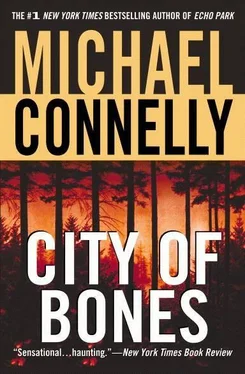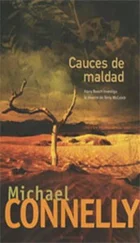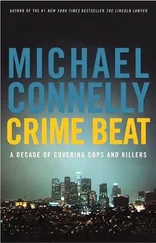After printing out the requests he put them in his briefcase. While normally it was proper on a weekend to fax a search warrant to a judge’s home for approval and signature, it would certainly not be acceptable to fax twenty-nine requests to a judge on a Sunday afternoon. Besides, the hospital lawyers would not be available on a Sunday anyway. Bosch’s plan was to take the warrants to a judge first thing Monday morning, then divide them with Edgar and hand-deliver them to the hospitals, thereby being able to push the urgency of the matter with the lawyers in person. Even if things went according to plan, Bosch didn’t expect to start receiving returns of records from the hospitals until mid-week or later.
Bosch next typed out a daily case summary as well as a recap of the anthropological information from Golliher. He put these in the murder book and then typed up an evidence report detailing the preliminary SID findings on the backpack.
When he was finished Bosch leaned back and thought about the unreadable letter that had been found in the backpack. He did not anticipate that the documents section would have any success with it. It would forever be the mystery shrouded in the mystery of the case. He gulped the last of his second cup of coffee and opened the murder book to the page containing a copy of the crime scene sketch and chart. He studied the chart and noted that the backpack had been found right next to the spot Kohl had marked as the probable original location of the body.
Bosch wasn’t sure what it all meant but instinctively he knew that the questions he now had about the case should be kept foremost in his mind as new evidence and details continued to be gathered. They would be the screen through which everything would be sifted.
He put the report into the murder book and then finished the updating of the paperwork by bringing the investigator’s log-an hour-by-hour time chart with small entry blocks-up to date. He then put the murder book in his briefcase.
Bosch took his coffee cup to the sink in the rest room and washed it out. He then returned it to its drawer, picked up his briefcase and headed out the back door to his car.
THE basement of Parker Center, the headquarters of the Los Angeles Police Department, serves as the record archives for every case the department has taken a report on in the modern era. Until the mid-nineties records were kept on paper for a period of eight years and then transferred to microfiche for permanent storage. The department now used computers for permanent storage and was also moving backward, putting older files into digital storage banks. But the process was slow and had not gone further back than the late eighties.
Bosch arrived at the counter in archives at one o’clock. He had two containers of coffee with him and two roast beef sandwiches from Philippe’s in a paper bag. He looked at the clerk and smiled.
“Believe it or not I need to see the fiche on missing person reports, nineteen seventy-five to ’eighty-five.”
The clerk, an old guy with a basement pallor, whistled and said, “Look out, Christine, here they come.”
Bosch smiled and nodded and didn’t know what the man was talking about. There appeared to be no one else behind the counter.
“The good news is they break up,” the clerk said. “I mean, I think it’s good news. You looking for adult or juvy records?”
“Juveniles.”
“Then that cuts it up a bit.”
“Thanks.”
“Don’t mention it.”
The clerk disappeared from the counter and Bosch waited. In four minutes the man came back with ten small envelopes containing microfiche sheets for the years Bosch requested. Altogether the stack was at least four inches thick.
Bosch went to a microfiche reader and copier, set out a sandwich and the two coffees and took the second sandwich back to the counter. The clerk refused the first offer but then took the sandwich when Bosch said it was from Philippe’s.
Bosch went back to the machine and started fiche-ing, wading first into the year 1985. He was looking for missing person and runaway reports of young males in the age range of the victim. Once he got proficient with the machine he was able to move quickly through the reports. He would scan first for the “closed” stamp that indicated the missing individual had returned home or been located. If there was no stamp his eyes would immediately go to the age and sex boxes on the form. If they fit the profile of his victim, he’d read the summary and then push the photocopy button on the machine to get a hard copy to take with him.
The microfiche also contained records of missing person reports forwarded to the LAPD by outside agencies seeking people believed to have gone to Los Angeles.
Despite his speed at the task, it took Bosch more than three hours to go through all the reports for the ten years he had requested. He had hard copies of more than three hundred reports in the tray to the side of the machine when he was finished. And he had no idea whether his effort had been worth the time or not.
Bosch rubbed his eyes and pinched the bridge of his nose. He had a headache from staring at the machine’s screen and reading tale after tale of parental anguish and juvenile angst. He looked over and realized he hadn’t eaten his sandwich.
He returned the stack of microfiche envelopes to the clerk and decided to do the computer work in Parker Center rather than drive back to Hollywood. From Parker Center he could jump on the 10 Freeway and shoot out to Venice for dinner at Julia Brasher’s house. It would be easier.
The squad room of the Robbery-Homicide Division was empty except for the two on-call detectives who were sitting in front of a television watching a football game. One of them was Bosch’s former partner, Kizmin Rider. The other Bosch didn’t recognize. Rider stood up smiling when she saw it was Bosch.
“Harry, what are you doing here?” she asked.
“Working a case. I want to use a computer, that all right?”
“That bone thing?”
He nodded.
“I heard about it on the news. Harry, this is Rick Thornton, my partner.”
Bosch shook his hand and introduced himself.
“I hope she makes you look as good as she did me.”
Thornton just nodded and smiled and Rider looked embarrassed.
“Come on over to my desk,” she said. “You can use my computer.”
She showed him the way and let him sit in her seat.
“We’re just twiddling our thumbs here. Nothing happening. I don’t even like football.”
“Don’t complain about the slow days. Didn’t anybody ever tell you that?”
“Yeah, my old partner. Only thing he ever said that made any sense.”
“I bet.”
“Anything I can do to help?”
“I’m just running the names-the usual.”
He opened his briefcase and took out the murder book. He opened it to a page where he had listed the names, addresses and birth dates of residents on Wonderland Avenue who had been interviewed during the neighborhood canvas. It was a matter of routine and due diligence to run the name of every person investigators came across in an investigation.
“You want a coffee or something?” Rider asked.
“Nah, I’m fine. Thanks, Kiz.”
He nodded in the direction of Thornton, who had his back to them and was on the other side of the room.
“How are things going?”
She shrugged her shoulders.
“Every now and then he lets me do some real detective work,” she said in a whisper.
“Well, you can always come back to Hollywood,” he whispered back with a smile.
He started typing in the commands for entering the National Crime Index Computer. Immediately, Rider made a sound of derision.
“Harry, you’re still typing with two fingers?”
Читать дальше












